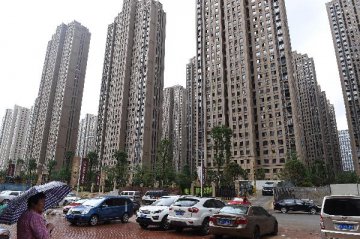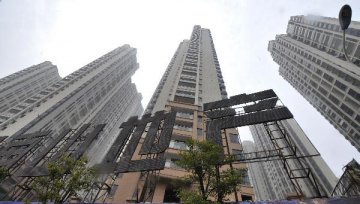
The central government has stepped up efforts to rein in house prices and contain speculative house purchases, and it is confident that its measures will continue to cool the overheated property market.
Starting Tuesday, both the minimum down payment on property in Shanghai and loan interest will be increased, while banks have been ordered to tighten their purse strings, too, according to a notice issued Monday evening by Shanghai's housing and banking authorities.
First-time home buyers in Shanghai must pay a minimum 35 percent deposit on purchases, the down payment on second homes will be increased to 50 percent, and buyers of commercial properties must now pay a minimum 70 percent deposit.
Meanwhile, banks have been ordered to raise interest rates by 10 percent for second-time borrowers from the government's Housing Provident Fund (HPF).
The maximum amount people can now borrow from the HPF has been lowered by 100,000 yuan (14,492 U.S. dollars).
In addition, people can only receive an HPF loan twice. "The measures come as no surprise, to me, as housing prices in Shanghai have remained high despite the policies rolled out in early October," said Lu Wenxi, a market analyst at Shanghai Centaline Property.
New home prices in Shanghai, excluding government-funded affordable housing, rose 0.5 percent last month from September, according to the National Bureau of Statistics (NBS).
On a year-on-year basis, however, home prices jumped 37.4 percent in October, the NBS data showed.
The new rules will make it harder for home buyers to secure down payments and loans, which will help reduce property speculation and stabilize the housing market, said Yan Yuejin, senior researcher with E-house China R&D Institute.
This latest round of property restrictions follows two years of progressive policy easing, starting with the relaxation of purchase restrictions in 2014.
The momentum was further fueled by the government's pro-growth policies, including interest rate cuts and lower deposit requirements.
Since late September, a wave of property restrictions introduced to more than 20 cities -- including Beijing, Shanghai and Shenzhen -- have cooled speculation, reduced transactions, reduced the risk of asset bubbles and stabilized the market.
Seven of 70 large- and medium-sized cities surveyed in the second half of October reported new home prices drops month on month, up from two in the first half of the year, according to NBS.
Compared with September, the month-on-month price index for both new and used residential property in those cities retreated in October, even though most cities still reported rises, NBS data showed.
Transactions of residential property in the 21 surveyed cities dropped 16.23 percent month on month and 21.99 percent year on year in November, according to statistics released on Monday from China Index Academy (CIA), a private property research institute.
Home prices in large- and medium-sized cities still registered an up tick in October, but the growth pace was slower than September, evidence of nascent effects of these tightening moves, said Zhang Dawei, analyst of Centaline Property.
He predicted that the transaction volume will continue on a downward trend in the final quarter of the year.
Yan Yuejin agreed, noting that chances are slim for higher home prices by the end of the year and property transactions will continue to slump.
In the latest Moody's report released Monday, the global rating agency forecast a stable outlook for China's residential property market in 2017, but regulatory risk remains high in light of the rapid growth in property and land prices.
"We expect the growth in nationwide contracted sales -- in terms of sales value -- to be flat or slightly negative in 2017, against a high base of contracted sales value for 2016," said the report.
Moody's said that a sharp decline in prices is unlikely in the next six-12 months, given the relative low inventory levels in high-tier cities.
It noted that a further dramatic tightening of regulatory measures to curb persistently high property prices, leading to an over five percent fall in national contracted sales over six-12 months, could result in a shift of the sector's outlook to negative.
























Latest comments